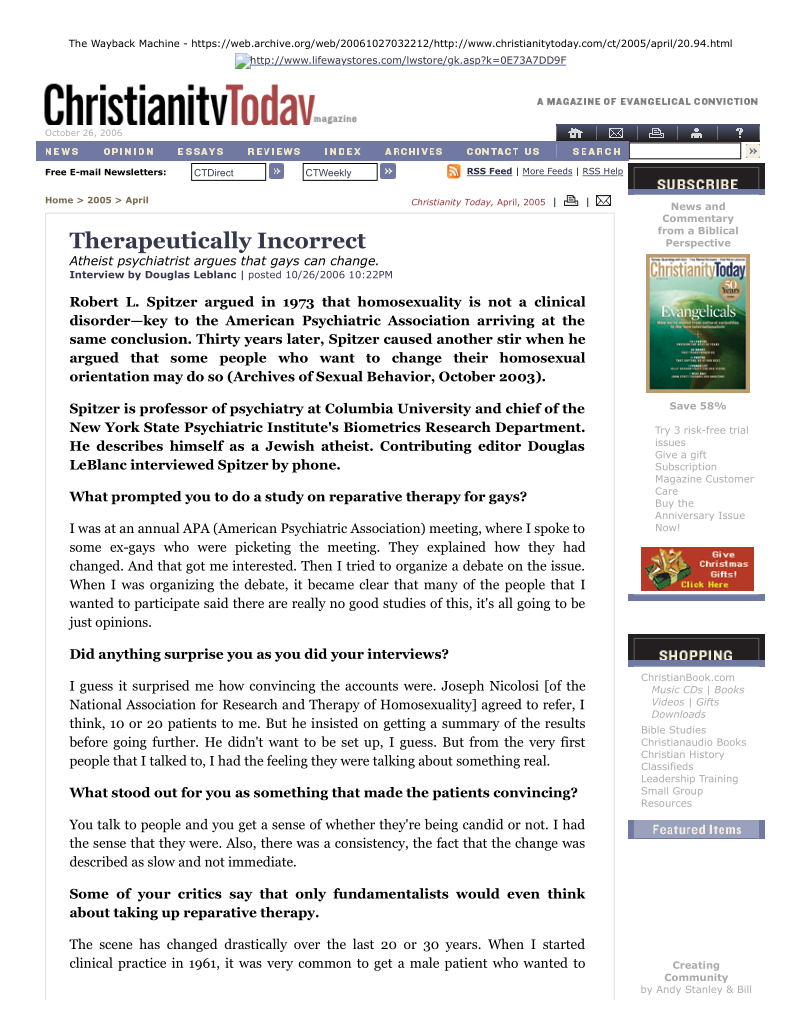Robert L. Spitzer states that the subjects of his 2001 study were candid and consistent and were "talking about something real".
- Type
- News (traditional)
- Hearsay
- Scribed VerbatimDirectJournalism
- Reference
Douglas Leblanc, "Therapeutically Incorrect," Christianity Today, April 2005, posted online October 2006
- Scribe/Publisher
- Christianity Today
- Audience
- Reading Public
- Transcription
Therapeutically Incorrect
Atheist psychiatrist argues that gays can change.
Interview by Douglas Leblanc | posted 10/26/2006 10:22PM
Robert L. Spitzer argued in 1973 that homosexuality is not a clinical disorder—key to the American Psychiatric Association arriving at the same conclusion. Thirty years later, Spitzer caused another stir when he argued that some people who want to change their homosexual orientation may do so (Archives of Sexual Behavior, October 2003).
Spitzer is professor of psychiatry at Columbia University and chief of the New York State Psychiatric Institute's Biometrics Research Department. He describes himself as a Jewish atheist. Contributing editor Douglas LeBlanc interviewed Spitzer by phone.
What prompted you to do a study on reparative therapy for gays?
I was at an annual APA (American Psychiatric Association) meeting, where I spoke to some ex-gays who were picketing the meeting. They explained how they had changed. And that got me interested. Then I tried to organize a debate on the issue. When I was organizing the debate, it became clear that many of the people that I wanted to participate said there are really no good studies of this, it's all going to be just opinions.
Did anything surprise you as you did your interviews?
I guess it surprised me how convincing the accounts were. Joseph Nicolosi [of the National Association for Research and Therapy of Homosexuality] agreed to refer, I think, 10 or 20 patients to me. But he insisted on getting a summary of the results before going further. He didn't want to be set up, I guess. But from the very first people that I talked to, I had the feeling they were talking about something real.
What stood out for you as something that made the patients convincing?
You talk to people and you get a sense of whether they're being candid or not. I had the sense that they were. Also, there was a consistency, the fact that the change was described as slow and not immediate.
Some of your critics say that only fundamentalists would even think about taking up reparative therapy.
The scene has changed drastically over the last 20 or 30 years. When I started clinical practice in 1961, it was very common to get a male patient who wanted to change. Today those people don't go to psychiatrists because the word is out that the mental health profession doesn't regard it as a problem.
How has the study affected your standing among your colleagues?
Many colleagues were outraged. I remember when it first appeared in the media, I got a letter from, I think, a dean of admissions at Columbia. He wrote me that it was just a disgrace that a Columbia professor should do such a thing. Within the gay community, there was initially tremendous anger and feeling that I had betrayed them. I think that has largely dissipated. But also, I'm at the point in my career that I don't worry about such things.
Have you considered conducting a follow-up study?
No. I feel a little battle fatigue. But also I'm not sure what the study would be. Some people have said, "Follow these people, interview them five years later, see how many of them have switched back," since it's well known that some ex-gays give it up.
But suppose you found that 5 percent or 10 percent did switch back. I mean, so what? You'd find the same thing if you followed people who had treatment for drug addiction. Some are going to relapse.
The study that ought to be done is a controlled study where people go into the therapy, and then you initially evaluate them, and then you evaluate them later and see how many actually changed. But that study is not going to be done, unfortunately.
Is that because of a lack of interest or funding?
The reasons are, number one, reparative therapists are not scientists—they don't do studies. The second reason is, if somebody proposed that the National Institute of Mental Health do such a study, I think almost certainly any gays in the study section would say this is a total waste of time: They would say, We already know it's hokum, so why do it?
You've said very clearly that no one should be coerced into reparative therapy.
I think the politically correct term now is reorientation therapy. Reparative already implies something's broken—of course the reparative therapists believe this, but it kind of infuriates the gays to even call it reparative therapy.
- Citations in Mormonr Qnas
The B. H. Roberts Foundation is not owned by, operated by, or affiliated with the Church of Jesus Christ of Latter-day Saints.

